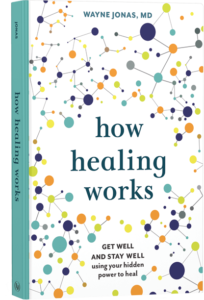In the first part of our two-part series on chronic kidney disease, we explored the prevalence of this condition—that 37 million Americans have it but 90% are unaware[ii] —as well as its causes, effects, and the groups that are especially at risk.
We also discussed conventional medicine’s typical approach to treating the condition, which includes medications, working with a nutritionist/dietician, regular physical activity, adequate nightly sleep, not smoking, and managing long-term stress and depression.
In part two, we will discuss the power of integrative medicine/health when treating chronic kidney disease.
What is integrative health?
I have spent over 40 years as a primary care doctor. In that time, I have been an advocate for integrative health—in fact, I even wrote a book about it!
Integrative health is a scientifically proven effective combination of conventional medicine, non-drug, complementary medicine, and behavioral and lifestyle changes.
This method is especially effective when treating chronic diseases because it has the ability to unlock the body’s natural ability to heal, which is the source of 80% of all healing.
The truth is that chronic kidney disease is not curable, as kidneys are not regenerative and so lack the ability to repair themselves. However, an integrative approach can not only improve your quality of life but also prevent your condition from worsening. Even if a patient has reached the final stage—End-Stage Renal Disease—a whole person, integrative health approach can help address the symptoms, such as pain, stress, and anxiety to improve a person’s quality of life.
However, before making any changes, always speak with your provider first.
Why integrative health?
Studies have found that as many as 54.9% of patients diagnosed with chronic kidney disease are using integrative medicine to mitigate the symptoms and the disease’s progression.[ii]
An integrative health approach focuses on the whole person rather than on their parts—on the disease as a whole rather than on the symptoms. Modern medicine often masks the symptoms and can, in the process, create other symptoms. Integrative health, on the other hand, treats the disease by treating the person and thereby enabling the body to heal itself. This is especially powerful when treating chronic diseases, which can affect a whole person and that person’s whole life.
Integrative health approaches
Acupuncture: Acupuncture is a powerful technique that uses needles on specific points on the skin to stimulate the production of chemicals like endorphins.
Generally producing only mild and transient side effects, if any, when applied by a professional, studies suggest that acupuncture can reduce, among other chemicals, levels of creatinine, which is the protein that is waste produced by muscle and that builds up in the body if the kidneys are damaged.[iii] This could not only slow the progression of the disease but ease the symptoms.
Yoga: Numerous studies have shown the effectiveness of yoga for easing stress and improving mental health and pain management. The same is true for chronic kidney disease.
Yoga, when practiced at least 5 times a week and for 40 – 60 minutes at a time and in combination with conventional medicine, can decrease blood pressure while improving the patient’s physical and psychological quality of life, including their pain, fatigue, sleep disturbance, and ability to be physically active.[iv]
Moving meditations: Moving meditations include the practice of tai chi and qigong. By combining slow and deliberate movements with meditation and breathing practice, they can build balance, coordination, strength, and functional capacity with minimal side effects. This can have an especially powerful effect on treating the symptoms and slowing the progression of chronic kidney disease.
Energy Healing: This practice, which includes approaches like the laying on of hands and reiki, is when a therapist helps to harness or manipulate a patient’s subtle energy in order to restore the body’s balance and improve its ability to heal. This practice has been used for thousands of years, particularly in traditional Chinese and Indian medicine.
Although studies have been small, they have been shown to increase the well-being of patients suffering from chronic kidney disease by decreasing anxiety, pain, and depression.[v]
Vitamins and Supplements: Vitamins and supplements—such as B Complex, Iron, Vitamin C, Vitamin D, and Calcium—are an important part of healing and maintaining a healthy body. They are often added as chronic kidney disease progresses in order to ensure your body has a healthy level of important nutrients.
However, some vitamins and supplements—such as A, E, and K—can actually further damage the kidneys and actually increase the speed by which the disease progresses, so it is crucial that you speak with your provider before taking any.
Review our guide for a list of supplements to consider and those to avoid. However, always speak with your doctor first.
The power of integrative health
Integrative health’s power lies in the fact that it works alongside conventional approaches to treating chronic kidney disease.
Combining integrative health with an appropriate diet, regular exercise, and self-care activities, your disease may never progress to End-Stage Renal Disease, and you may never need dialysis.
But it is never too late to take an integrative health approach. Even if you are in the final stage of the disease, integrative health can reduce the stress of dialysis or transplant and slow the disease’s progression.
It is, however, always important to keep your health care team informed of any and all changes you might be considering taking and to make your treatment plan your own by trying various forms of integrative health to determine the one that is most right for you.
To learn more about this series and the studies behind my advocating for an integrative health approach, see our free guide An Integrative Health Approach to Chronic Kidney Disease.
References
[i] Kidney Disease: The Basics. (2021). National Kidney Foundation, Retrieved https://www.kidney.org/news/ newsroom/fsindex
[ii] KauricKlein Z. (2019). Effect of yoga on physical and psychological outcomes in patients on chronic hemodialysis. Complementary Therapies in Clinical Practice, 34, 41–45. https://doi-org.liboff.ohsu. edu/10.1016/j.ctcp.2018.11.004
[iii] Yu, J. S., Ho, C. H., Wang, H. Y., Chen, Y. H., & Hsieh, C. L. (2017). Acupuncture on Renal Function in Patients with Chronic Kidney Disease: A Single-Blinded, Randomized, Preliminary Controlled Study. Journal Of Alternative And Complementary Medicine (New York, N.Y.), 23(8), 624–631. https://doi-org.liboff.ohsu. edu/10.1089/acm.2016.0119
[iv] Pandey, R. K., Arya, T. V., Kumar, A., & Yadav, A. (2017). Effects of 6 months yoga program on renal functions and quality of life in patients suffering from chronic kidney disease. International Journal of Yoga, 10(1), 3–8. https://doi-org.liboff.ohsu.edu/10.4103/0973- 6131.186158
[v] Khatri, M., Moon, Y. P., Scarmeas, N., Gu, Y., Gardener, H., Cheung, K., Wright, C. B., Sacco, R. L., Nickolas, T. L., & Elkind, M. S. (2014). The association between a Mediterranean-style diet and kidney function in the Northern Manhattan Study cohort. Clinical journal of the American Society of Nephrology: CJASN, 9(11), 1868– 1875. https://doi.org/10.2215/CJN.01080114

Take Your Health Into Your Own Hands
Drawing on 40 years of research and patient care, Dr. Wayne Jonas explains how 80 percent of healing occurs organically and how to activate the healing process.
